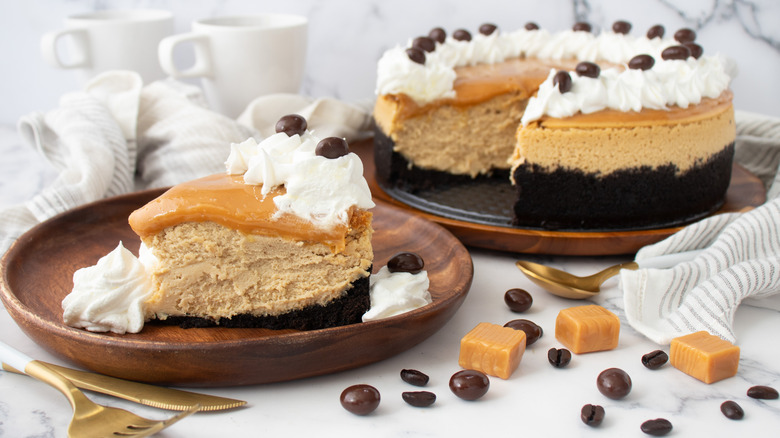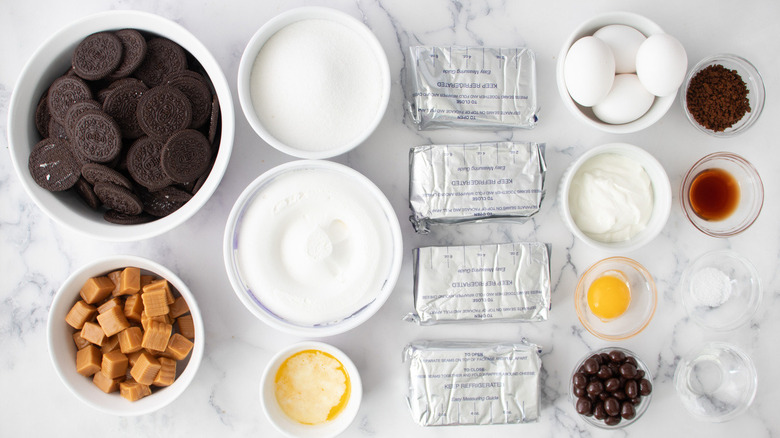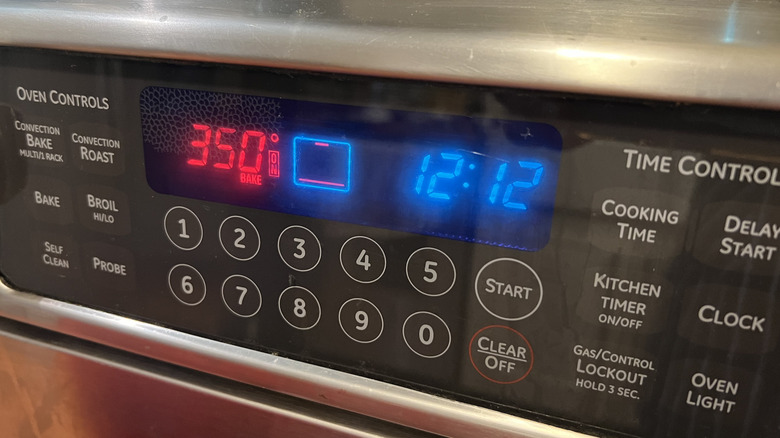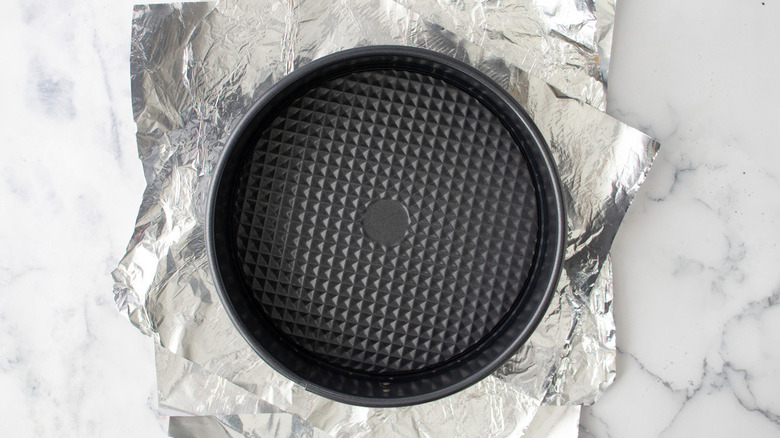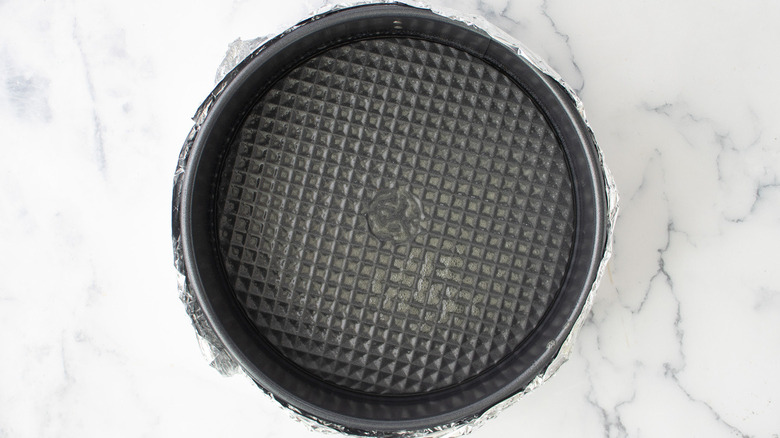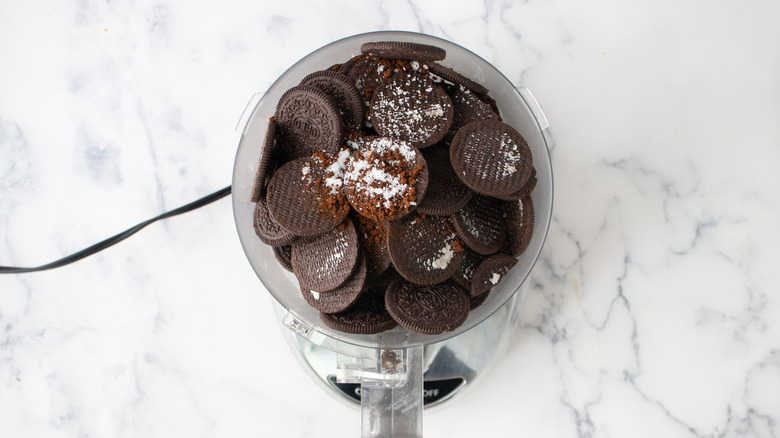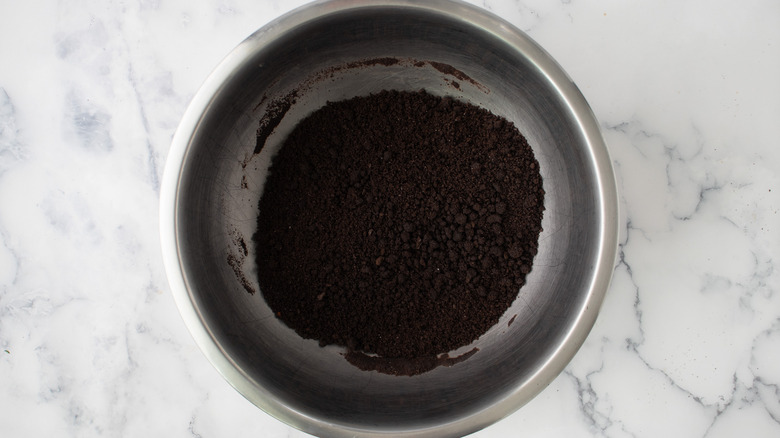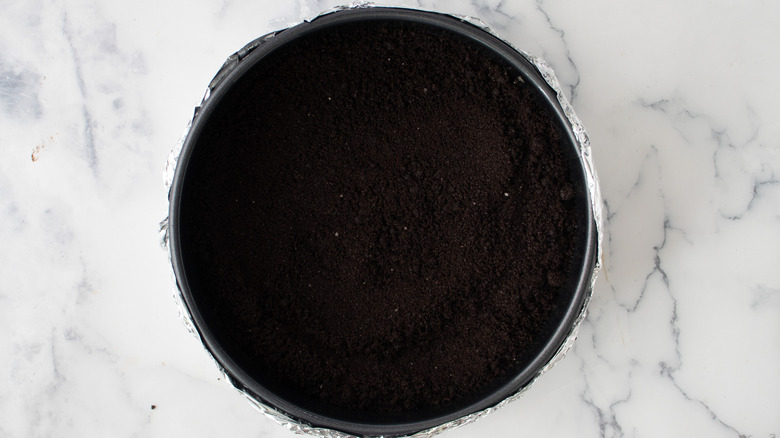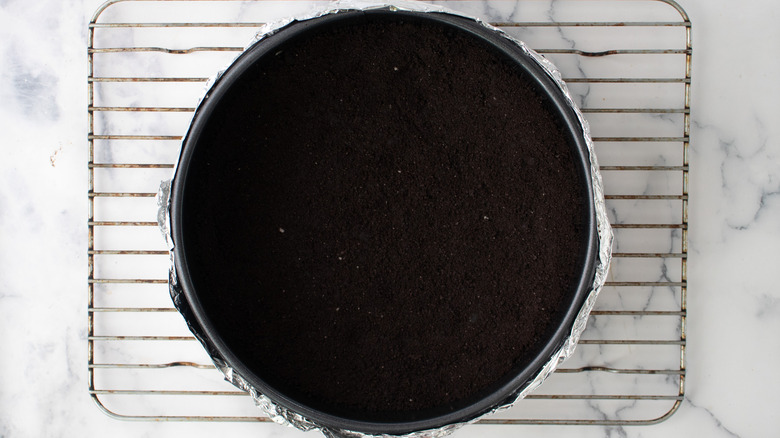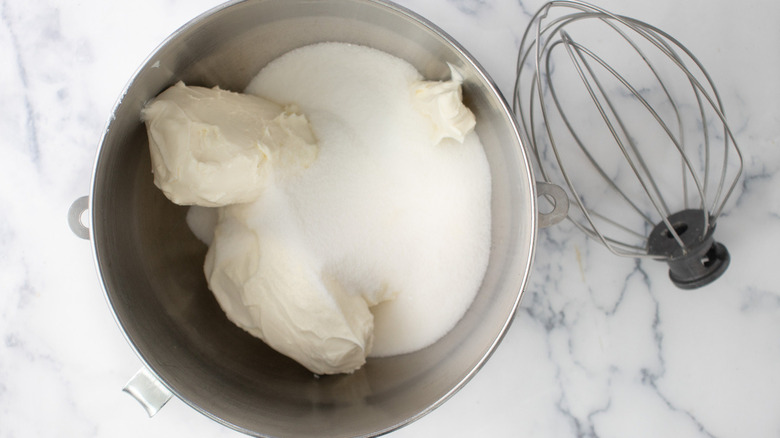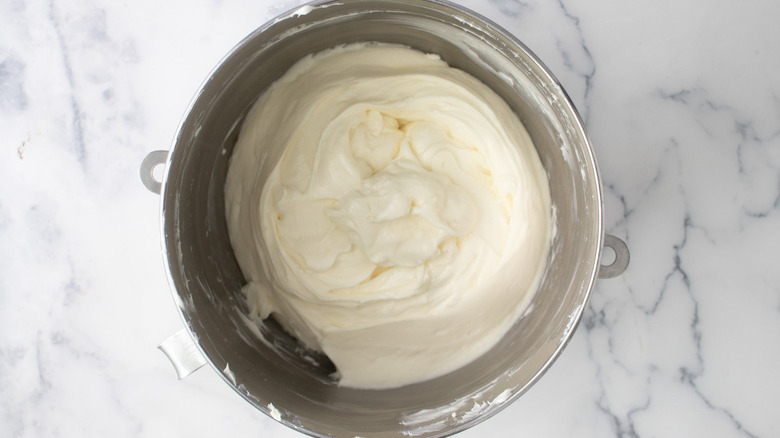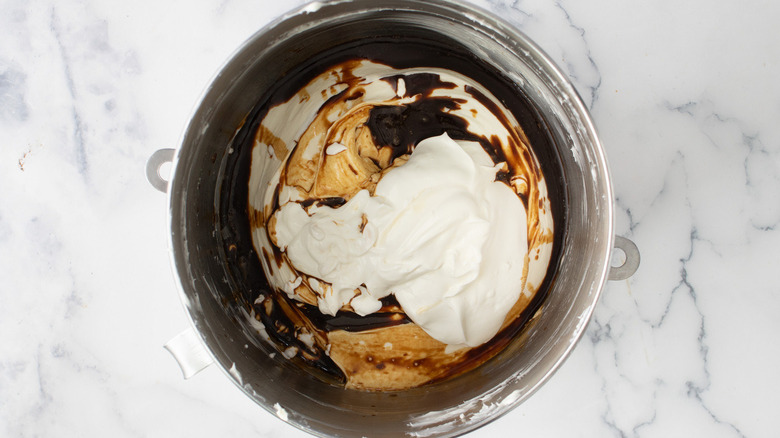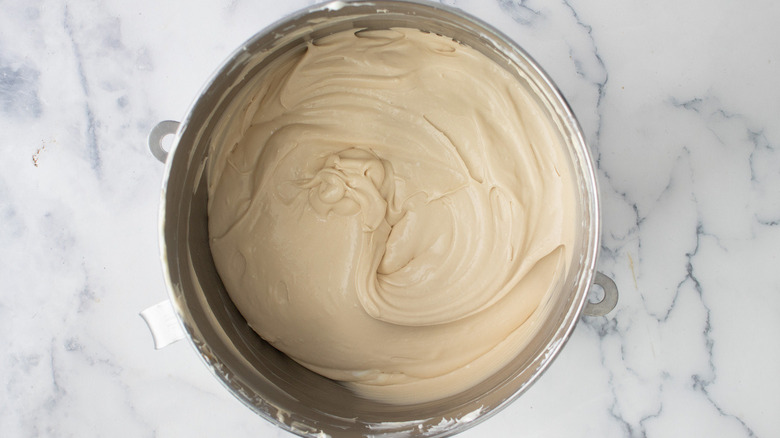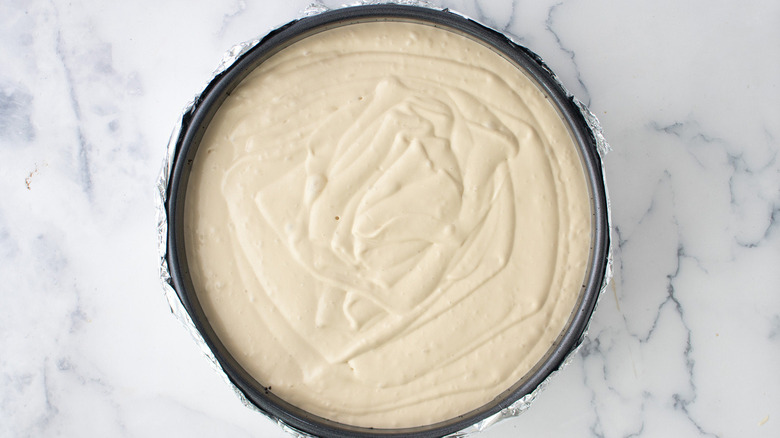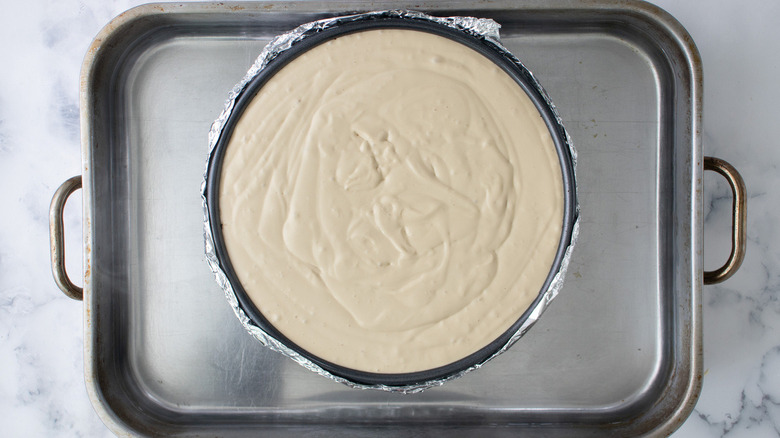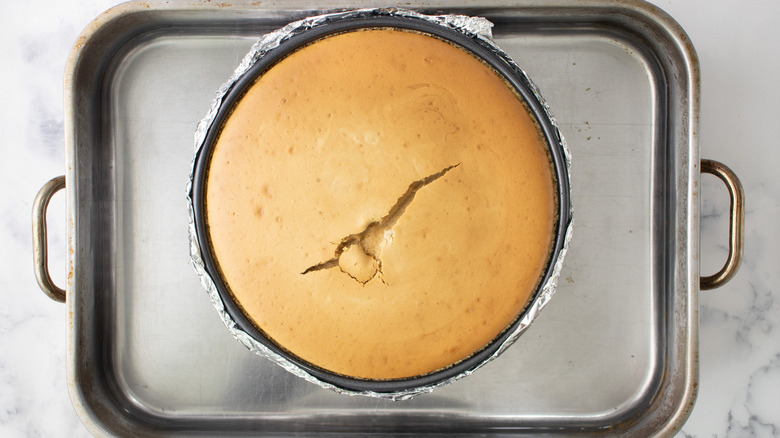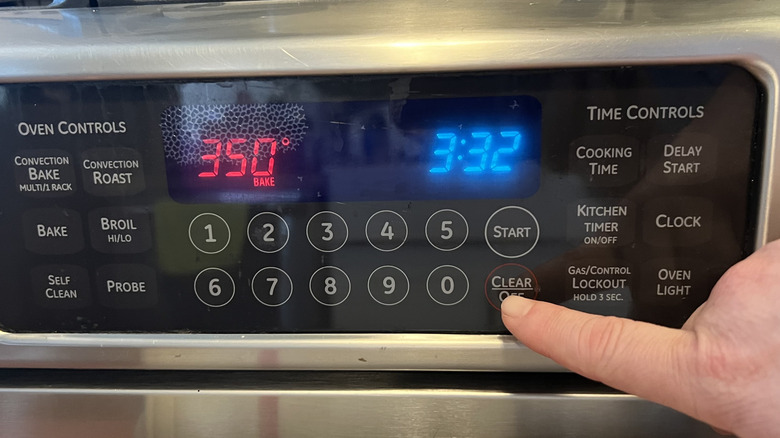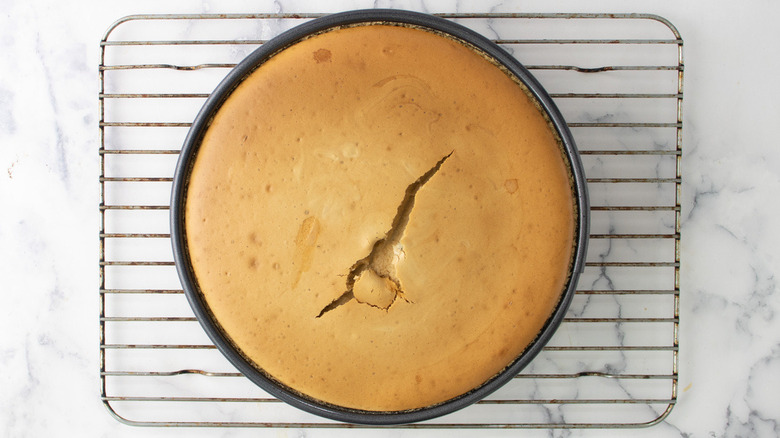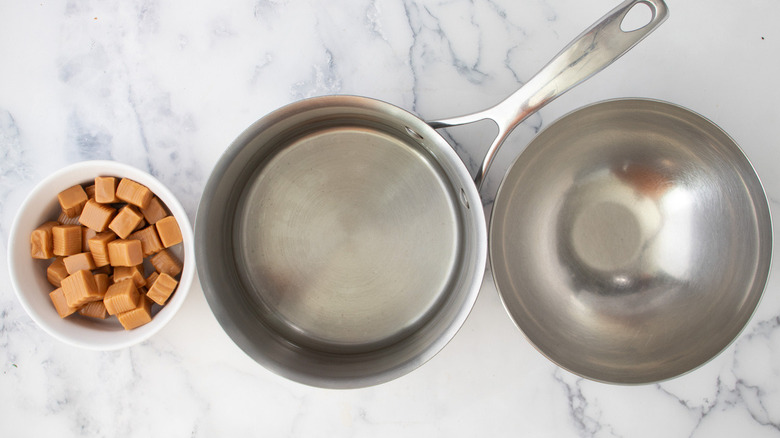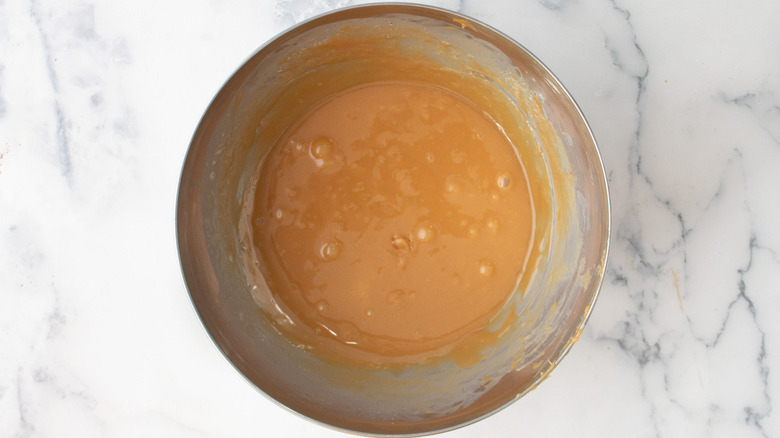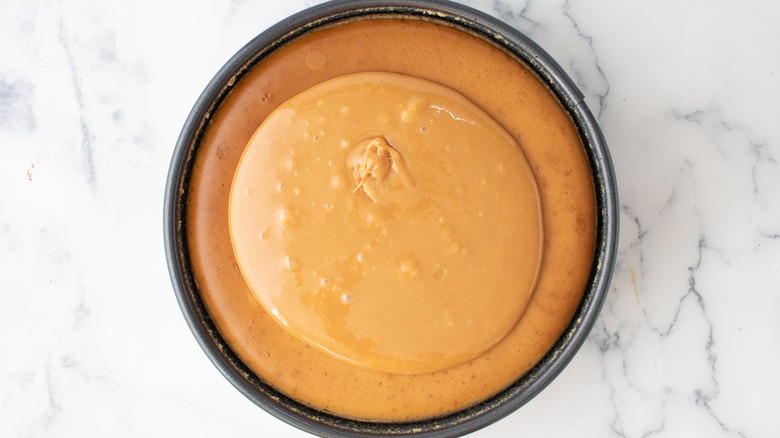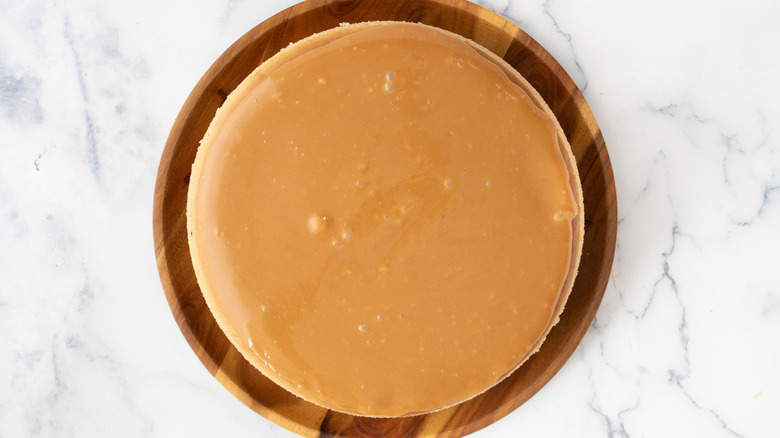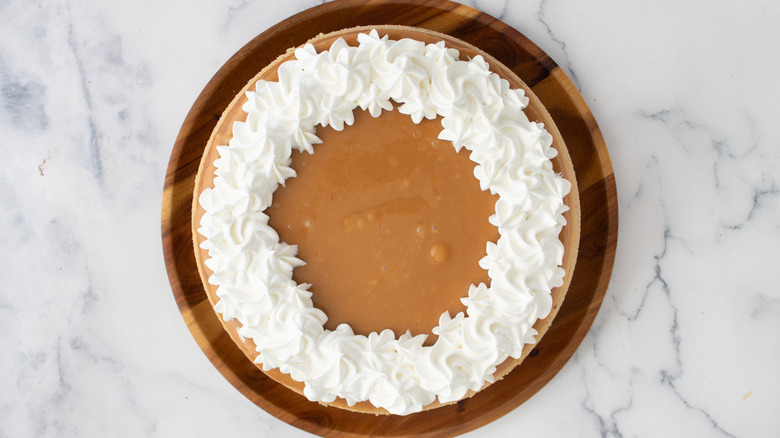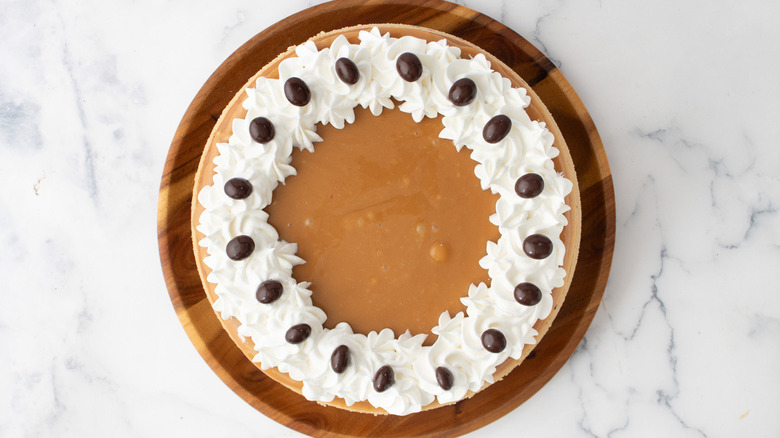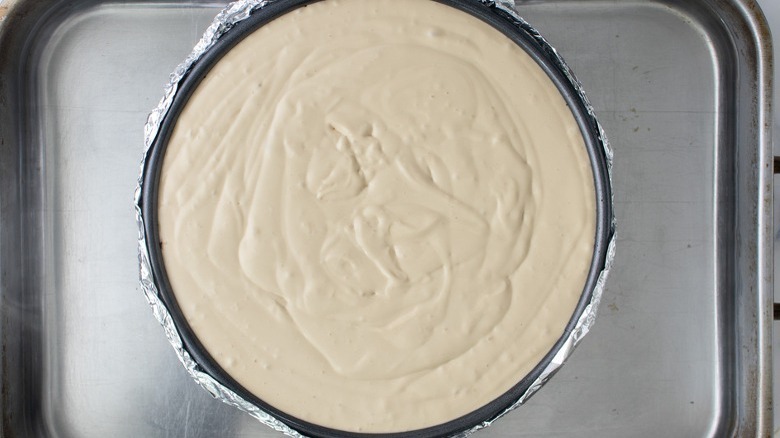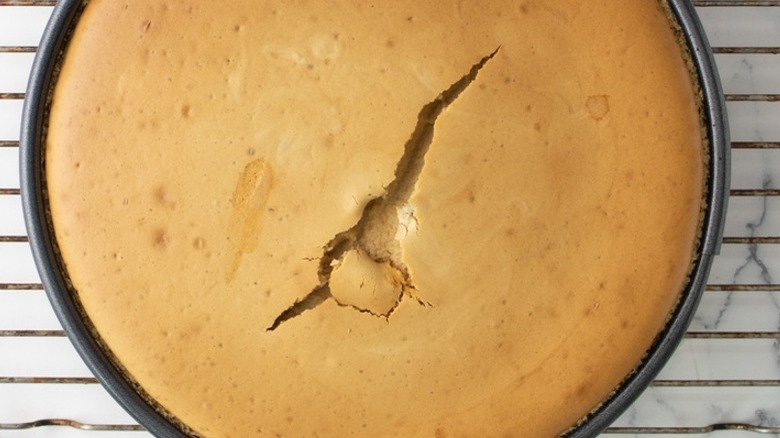Caramel Macchiato Coffee Cheesecake Recipe
As recipe developer Patterson Watkins tells us, in making this caramel macchiato coffee cheesecake, "I just turned my favorite coffee treat into an even bigger treat." Not only did she intend the cheesecake to have the caramel and coffee flavors, but she also wanted it to resemble the drink, as well. To this end, she begins with an espresso-infused chocolate cookie crust meant to look like the drink's dark espresso layer, while the middle cheesecake layer looks (and tastes) like coffee with cream. She finishes the cake off with the type of caramel and cream topping that you might find on a Starbucks-style macchiato (if not a traditional one) and even adds a few chocolate-covered coffee beans for flair.
While this cheesecake does take a little work to put together, none of the steps are particularly difficult, and the end result is more than worth it. Watkins does caution, though, "Depending on the caramel candies used, slicing and serving your cheesecake can be a bit of a task." She suggests that you dip your cake knife into hot water to warm it up before you cut to achieve that perfect slice of cheesecake. Another option is to slice through the caramel layer to score the cake before the topping has fully set.
Collect the ingredients for the caramel macchiato coffee cheesecake
For the cake itself, you'll need espresso or coffee powder, vanilla, cream cheese, sugar, sour cream, and eggs, while you'll also need chocolate sandwich cookies, salt, and butter for the crust. To decorate the cake, you'll be using caramel candies and whipped topping (you can swap this out for flavored whipped cream if you like) along with a handful of chocolate-dipped coffee beans.
Step 1: Preheat the oven
Preheat the oven to 350 F.
Step 2: Prepare a pan
Wrap the bottom and sides of a springform pan in aluminum foil.
Step 3: Grease the pan
Spritz the bottom and sides (inside) of the springform pan with cooking spray and set aside.
Step 4: Crush the cookie crumbs
To make the crust, place Oreo cookies, espresso powder, and salt in the bowl of a food processor. Blend until fine and transfer to a large bowl.
Step 5: Combine the crumbs with butter
Add the melted butter to the bowl and stir to combine (consistency of wet sand).
Step 6: Put the crust in the pan
Transfer the crust mixture to the prepared springform pan, spread out evenly, and firmly press into the bottom and sides.
Step 7: Cook the crust
Place the pan in the oven and bake for 10 minutes, then set it on a wire rack to cool.
Step 8: Mix the coffee powder, water, and vanilla
To make the filling, place espresso powder, vanilla extract, and hot water in a medium bowl, stir to combine, and set aside to steep for 2-3 minutes.
Step 9: Beat the cream cheese and sugar
Place softened cream cheese and granulated sugar in the bowl of a mixer, fitted with a whisk attachment, and beat, on medium, until smooth (no lumps).
Step 10: Stir in the coffee and sour cream
Add the steeped coffee mixture and sour cream to the bowl and continue to mix until combined.
Step 11: Add the eggs
Working with just 1 egg or yolk at a time, add to the bowl, and mix until blended before adding another.
Step 12: Fill the crust with batter
Pour the filling into the cooled crust, spread out evenly, and gently tap to remove any air bubbles.
Step 13: Put the cheesecake in a water bath
Place the filled springform pan in a large roasting pan. Fill the roasting pan with hot water, filling just enough to come halfway up the sides of the springform pan.
Step 14: Bake the cheesecake
Carefully place the pan in the oven and bake for 1 hour and 30 minutes or until the internal temperature of the cheesecake reaches 150°F (firm around the edges and slightly jiggly in the center).
Step 15: Cool the cheesecake in the oven
Turn the oven off, leaving the cheesecake inside, letting the oven and the cake rest for 1 hour.
Step 16: Cool the cheesecake on a rack
Remove the cheesecake from the oven, remove the cake from the water bath, and set aside on a wire rack to cool completely at room temperature, about 1 hour.
Step 17: Put the caramels in a pot
Once the cheesecake has cooled at room temperature, place the soft caramel candies in a double boiler.
Step 18: Melt the caramels
Melt the caramel over medium heat until runny, about 5-8 minutes.
Step 19: Top the cake with melted caramel
Pour the caramel over the top of the cake, swirling the pan to coat. Loosely cover the cake and place it in the refrigerator to cool and set, for 8 hours to overnight.
Step 20: Take the cake out of the pan
Once set and chilled, remove the cheesecake from the springform pan, and transfer to a serving plate or platter.
Step 21: Decorate the cake with whipped topping
Pipe or dollop the top of the cheesecake with whipped topping.
Step 22: Serve the cheesecake
Garnish the cheesecake with chocolate covered espresso beans before slicing and serving.
What is the bain-marie method for cooking cheesecake?
This cheesecake recipe, like many others, employs a method called bain-marie or water bath. As Watkins tells us, "Think of a bain-marie as a hot hug for your cheesecake." This method allows the cake to cook more evenly and adds moisture to the air inside the oven, which helps keep the cake from becoming too dry as it cooks since cheesecakes are supposed to be rich and dense instead of crumbly. As Watkins points out, "A cheesecake is sort of a combination of a mousse and a souffle, notoriously finicky dishes that need a little culinary safeguarding to ensure a fluffy final product."
As for the layer of foil that you'll be wrapping around the outside of the cheesecake before it bakes, this is meant to keep any water from seeping into the two-piece springform pan. The foil serves two functions, however. According to Watkins, it also adds some extra insulation that, like the water bath, helps the cake to heat more evenly.
How do I prevent a cheesecake from cracking?
After putting in all this work to craft the perfect cheesecake, it can be disappointing to see that the top of the cake has cracked. As Watkins explains, there are two reasons this might happen. One of these is that you may have over-mixed the batter, particularly when adding the eggs. Over-mixing introduces too much air, which can cause your cake to crack. Yet another reason, however, is yielding to the urge to open the oven door to peek at the cake while it's cooking. This causes variations in the oven temperature, something that Watkins says is most often the culprit for cake cracks. As she advises, "Keep that oven door closed, my friends."
No matter how careful you are, sometimes cracks just happen. In this case, the best thing you can do is cover them up with a topping of some sort. With this recipe, Watkins assures us that the caramel topping "will hide any mild to moderate crack." Should your cracks be more severe, you also have that whipped topping to play with. "You can also get creative with your whipped topping placement if your caramel fails to hide that crack to your liking."
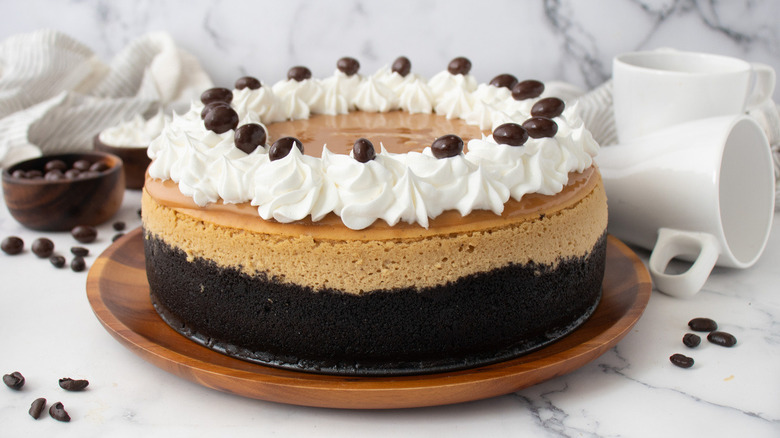
- For the crust
- 1 package (12 ounces) Oreo cookies, filling removed
- 1 teaspoon instant espresso or coffee powder
- Pinch salt
- 6 tablespoons melted butter
- For the filling
- 2 tablespoons instant espresso or coffee powder
- 2 teaspoons vanilla extract
- 3 tablespoons hot water
- 4 packages (32 ounces) cream cheese, softened
- 1 ½ cups granulated sugar
- ½ cup sour cream
- 4 eggs
- 1 egg yolk
- For the topping
- 1 package (11 ounces) soft caramel candies
- 2 cups whipped topping
- 12-16 chocolate covered espresso beans
- Preheat the oven to 350 F.
- Wrap the bottom and sides of a springform pan in aluminum foil.
- Spritz the bottom and sides (inside) of the springform pan with cooking spray and set aside.
- To make the crust, place Oreo cookies, espresso powder, and salt in the bowl of a food processor. Blend until fine and transfer to a large bowl.
- Add the melted butter to the bowl and stir to combine (consistency of wet sand).
- Transfer the crust mixture to the prepared springform pan, spread out evenly, and firmly press into the bottom and sides.
- Place the pan in the oven and bake for 10 minutes, then set it on a wire rack to cool.
- To make the filling, place espresso powder, vanilla extract, and hot water in a medium bowl, stir to combine, and set aside to steep for 2-3 minutes.
- Place softened cream cheese and granulated sugar in the bowl of a mixer, fitted with a whisk attachment, and beat, on medium, until smooth (no lumps).
- Add the steeped coffee mixture and sour cream to the bowl and continue to mix until combined.
- Working with just 1 egg or yolk at a time, add to the bowl, and mix until blended before adding another.
- Pour the filling into the cooled crust, spread out evenly, and gently tap to remove any air bubbles.
- Place the filled springform pan in a large roasting pan. Fill the roasting pan with hot water, filling just enough to come halfway up the sides of the springform pan.
- Carefully place the pan in the oven and bake for 1 hour and 30 minutes or until the internal temperature of the cheesecake reaches 150 F (firm around the edges and slightly jiggly in the center).
- Turn the oven off, leaving the cheesecake inside, letting the oven and the cake rest for 1 hour.
- Remove the cheesecake from the oven, remove the cake from the water bath, and set aside on a wire rack to cool completely at room temperature, about 1 hour.
- Once the cheesecake has cooled at room temperature, place the soft caramel candies in a double boiler.
- Melt the caramel over medium heat until runny, about 5-8 minutes.
- Pour the caramel over the top of the cake, swirling the pan to coat. Loosely cover the cake and place it in the refrigerator to cool and set, for 8 hours to overnight.
- Once set and chilled, remove the cheesecake from the springform pan, and transfer to a serving plate or platter.
- Pipe or dollop the top of the cheesecake with whipped topping.
- Garnish the cheesecake with chocolate covered espresso beans before slicing and serving.
| Calories per Serving | 722 |
| Total Fat | 45.0 g |
| Saturated Fat | 24.0 g |
| Trans Fat | 1.0 g |
| Cholesterol | 172.1 mg |
| Total Carbohydrates | 73.0 g |
| Dietary Fiber | 0.8 g |
| Total Sugars | 57.6 g |
| Sodium | 450.5 mg |
| Protein | 10.2 g |
